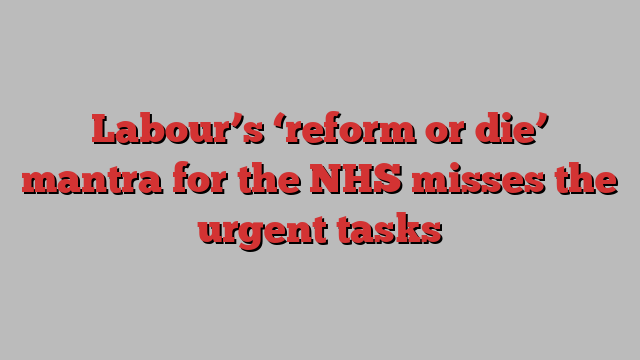
Unlock the Editor’s Digest for free
Roula Khalaf, Editor of the FT, selects her favourite stories in this weekly newsletter.
The writer is chief executive of the Health Foundation, a think-tank
The NHS must “reform or die” said the prime minister recently, adding “no more money without reform”. Whether a threat or simple statement of political probabilities, Keir Starmer’s statement is tinged with urgency and frustration. The government is trying to get to grips with the NHS in all its complexity when budgets and public patience are strained. But what should reform mean?
Step one is to act fast on operational must-dos. The recent review carried out by Lord Darzi concluded that the NHS is in a critical condition but its “vital signs” remain strong. The findings will embolden health secretary Wes Streeting to repeat his claim that “the NHS is broken” and provide political cover for an anticipated winter crisis. But that cover won’t stretch far. There is no choice but to focus relentlessly on the public’s priorities, in particular problems in emergency care, access to primary care and hospital waiting lists, and in that order. Honestly pursued, even if incomplete, gains on these hot-button issues will buy credibility and time for bigger change.
Ministers, however able and committed, are very new to the NHS. They should trust NHS leaders to get on with the operational job, visibly support them and hold them firmly to account for a small set of targets. Without much extra cash, and with significant workforce shortages and professional cynicism among staff, politicians should operate a positive big tent principle — all hands valued in an emergency — and resist blame when things inevitably go wrong. A positive partnership between government and the NHS with practical help to the frontline, including targeted investment in this month’s Budget, will help switch on some of the discretionary effort withdrawn by clinicians since the pandemic. Settling the go-slow collective action by GPs should also be addressed before it degenerates into a full-blown strike.
The second step is to develop an intelligent strategy for the medium term that has a hope of sustaining good quality affordable care for all. A 10-year plan for the NHS is scheduled for spring 2025, with Streeting having outlined three shifts it will aim to deliver: from sickness to prevention; from hospital to community; and from analogue to digital. The Darzi review added more, including using technology to unlock productivity; clarifying roles and accountabilities among NHS organisations; boosting management and increasing capital investment.
This can sound like a word salad composed of NHS jargon. But the strategy can be boiled down to what should be done, and how best to do it. Streeting’s three shifts are hardly new but they are right. The real thinking needed is on how — how to make fast enough progress to offset increasing demands on the NHS from an ageing and growing population, chronic disease, medical advances and more.
The most active ingredient for progress by far in NHS history has been investment — in new kit, buildings, workforce and treatments. Our analysis highlights a potential £38bn shortfall in NHS funding by the end of this parliament. Another approach has been adjusting the policy and management levers to nudge the system forward, for example the focus on targets, centralised performance management and market-style incentives in the 1990s and 2000s. As in other industries, these can have some impact but the game-changer is technology.
There is no clear plan yet for how the NHS prioritises the adoption of new technology, harnesses the emerging potential of AI and partners with the private sector to innovate. Bold investment in the NHS’s digital infrastructure and trials of productivity-enhancing technology are the urgent priority.
This is a screaming opportunity for reform given the mounting challenges ahead. Rachel Reeves said at the Labour party conference that “low investment feeds decline” so Starmer’s mantra might need rephrasing: “invest or die”.